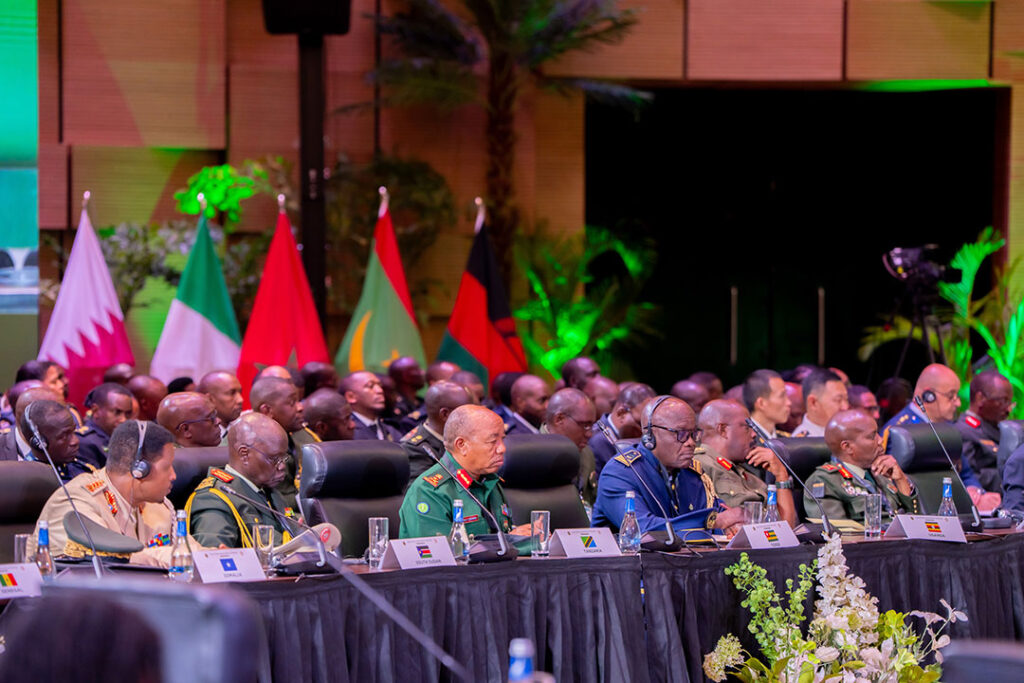Collective security was the primary focus of the recent Land Forces Commanders Symposium as African military leaders gathered to build and enhance bilateral and regional solutions to a rapidly evolving threat landscape.
Commanders from Algeria, Benin, Burkina Faso, Burundi, Chad, The Gambia, Guinea, Kenya, Malawi, Mauritania, Morocco, the Republic of the Congo, Rwanda, Senegal, Somalia, South Sudan and Uganda were among military leaders from 28 African countries along with defense experts and stakeholders from around the world who participated in the event at Intare Arena in Kigali on October 21 and 22.
Brig. Gen. Ronald Rwivanga, spokesperson for the Rwanda Defence Force (RDF), kicked off the opening ceremony with a clear message that African countries are stronger together than apart.
Collaboration with other countries strengthens collective capabilities and fosters mutual learning, he said. Interoperability between national armies is key to overcoming coordination challenges.
“This starts with ensuring peacetime interoperability through harmonized command structures, doctrines, standard operating procedures and communication,” he said. “Sometimes you need to have fewer nations working together to respond quickly. After we have brought the peace, then the United Nations can come with its peace support operations and resources. Both approaches can complement each other.”
Rwandan Army Chief of Staff Maj. Gen. Vincent Nyakarundi used the example of the Central African Republic to expound on the benefits of bilateral and multilateral security collaboration.
“[Partners] share a clear common understanding of the mission objectives, which are restoring peace, establishing state authority and protecting civilians,” he said during one of the symposium’s four panel discussions.
“This alignment fostered the mutual trust and accountability and also cohesion among the forces. The shared vision was reinforced through joint command structures, regular coordination meetings and integrated operational planning. This unity of purpose simplified communication and increased the overall effectiveness of the operation.”
Rwandan President Paul Kagame expressed optimism for the future of collective security operations with African countries working together to meet the continent’s complex security challenges.
“Africa still experiences the highest number of active conflicts in the world,” he said. “Addressing this reality requires strong continental partnerships and coordination mechanisms. We cannot expect others to carry the responsibility for Africa’s security. None of the challenges that we face are beyond our capacity to manage or resolve.”
Other panel discussions touched on operational challenges for land forces in a new era of drone warfare, ways to enhance interoperability and military diplomacy, and how to promote civil-military cooperation through citizen outreach programs.
“Just like you spend on guns, you must also spend on welfare to win the trust and confidence of the local population,” Rwivanga said. “It is useless to operate with only the approach of the military. We must work on the post-conflict situation, which then provides long-term results of stability.”
Rwanda’s Minister of Defence Juvenal Marizamunda closed the symposium by urging African leaders to take ownership and strengthen cooperation in addressing the complex security challenges that hinder the continent’s development.
“We operate in an increasingly complex and unpredictable environment, marked by asymmetric conflicts, transnational threats and crises that require decisive action,” he said. “In such times, the vital role of land forces cannot be overstated. They are the first responders in times of crisis, the stabilizing force during turmoil, and the foundation upon which peace is rebuilt.”

